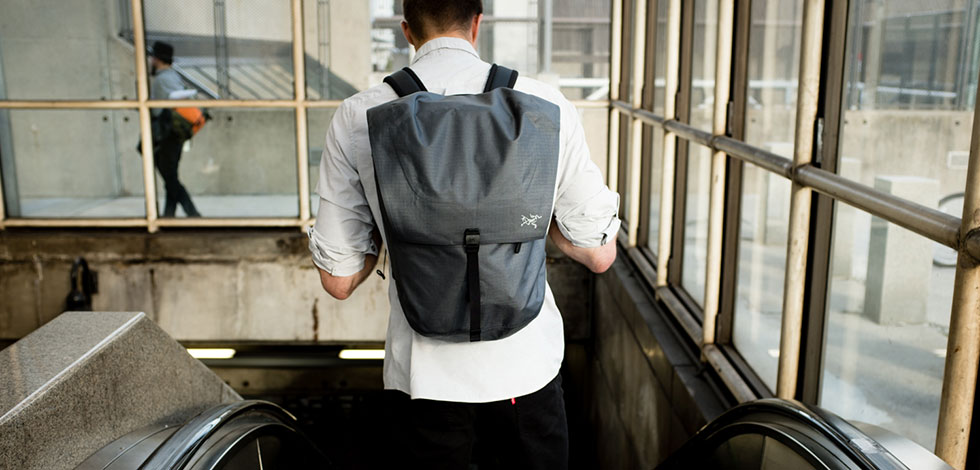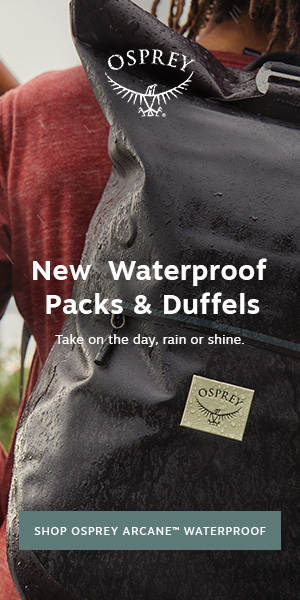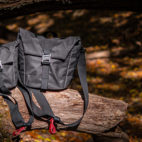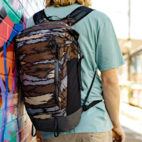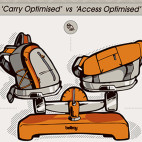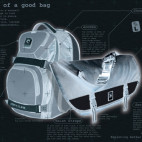Testing the Arc’teryx Granville Line
Few names in the world of carry are as respected as Arc’teryx. So when they released not one, but five new bags as part of their new Granville line I was eager to see what these packs could do. While the efficient design and clean aesthetic of these bags is immediately apparent, I reached out to Katie Mah, Lead designer of the Granville line and Vincent Beasse, Pack and Hardgood Product Line Manager at Arc’teryx to really get a sense of how the Granville line works.
The Lineage
As Katie explains, the predecessor to the whole Granville line was the Granville Pack. Part of a series of three urban bags, the original Granville was the most technically minded pack. It’s from this bag that the new Granville line evolved.
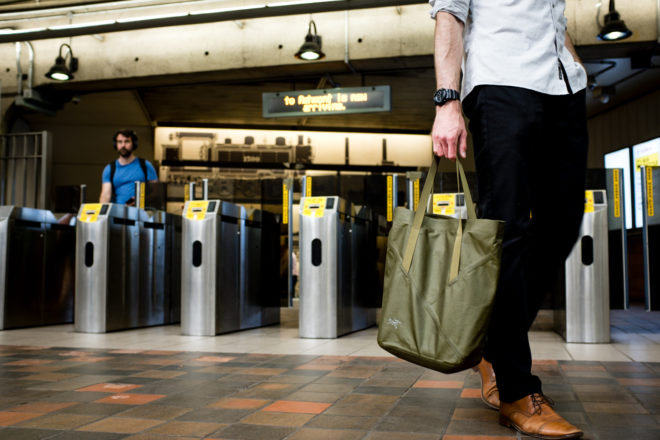
When building the current Granville line, this backpack was the starting point and built out from there. Long-time Arc’teryx fans will recognize the new Granville 20 Backpack as an evolved version of the original pack. And for those wondering, the name Granville refers to a major thoroughfare in Vancouver and the original name of Vancouver pre 1886.
The Line
The new Granville line is built around five bags. Two backpacks, the Granville 16 Zip Backpack and the Granville 20 Backpack. Two messenger (courier) bags, the Granville 16 Courier and the Granville 10 Courier. And finally the Granville 18 Tote rounds out the lineup.
While the bags are all fairly distinct, there’s a lot of commonality between their design. The most obvious is in the construction. All the bags use Arc’teryx’s AC² (Advanced Composite Construction), which combines a waterproof and durable 420D bondable fabric with custom components that can be laminated to the fabric, avoiding the constraints of traditional cut-and-sew construction. The seam-sealed bags are tough, lightweight and weatherproof, boast WaterTight zippers, and are decked out with similar hardware. However in talking with Katie and Vincent, it becomes clear how many requirements beyond keeping a consistent appearance these five bags were designed to meet.
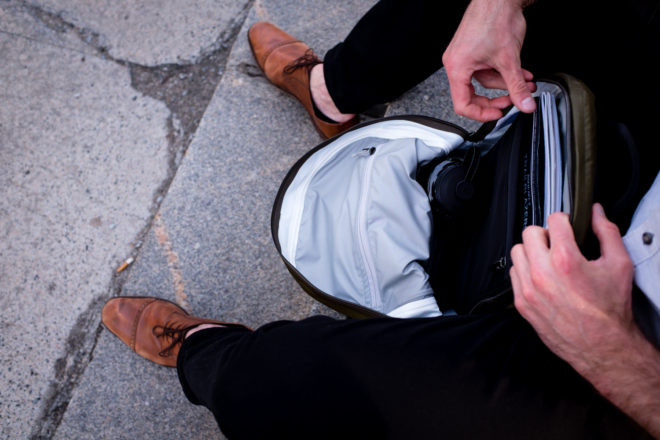
“Our offerings for the urban environment have definitely evolved,” explains Vincent. “Years ago you could see people around the [Arc’teryx] office using the Alpha FL backpack [a hardcore alpine pack] because there were no small daypacks in our product line.”
Design DNA
With the new Granville line Arc’teryx is now designing daypacks with a worldwide audience in mind. Katie tells me that while the material and construction on the Granville line remains identical to that of Arc’teryx’s dedicated outdoor bags, the design goals have definitely shifted.

For the Granville line Katie explains there were six key design points. First, how can these bags be designed to allow for movement and efficiency while keeping a clean aesthetic? Second, how can the organization of all the bags be simplified while, third, allowing for ease of access? Fourth, and the team is very proud of this, how can high-quality suspensions be built that work for all body types, regardless of gender? Fifth, how can the security of the bags be increased? And finally, how can this all be done while maintaining high-quality touch points throughout the line?
Sounds simple, right?
Granville 20 Backpack
20L, 30 oz, $229
If a suave messenger bag (we’ll say the Granville 16 Courier Bag) had a love child with a sleek backpack (perhaps the Granville 16 Zip Backpack), the Granville 20 Backpack would be the result. The bag is first and foremost a backpack, no question there, but the layout and access of this bag make it feel like a messenger bag.
In talking with Katie and Vincent, it becomes clear how many requirements beyond keeping a consistent appearance these five bags were designed to meet.
Opening up the bag one-handed thanks to the Arc’teryx release buckle reveals the classic messenger bag layout – a flap concealing a small zippered compartment and the main, also zippered area. Curious about why a zipper would be placed beneath the flap and not just zip the entire flap, Vincent explains that “the APAC (Asia Pacific) region wanted more security in their bags while the American region wanted ease of access.” This design is the result of artfully catering for both markets.
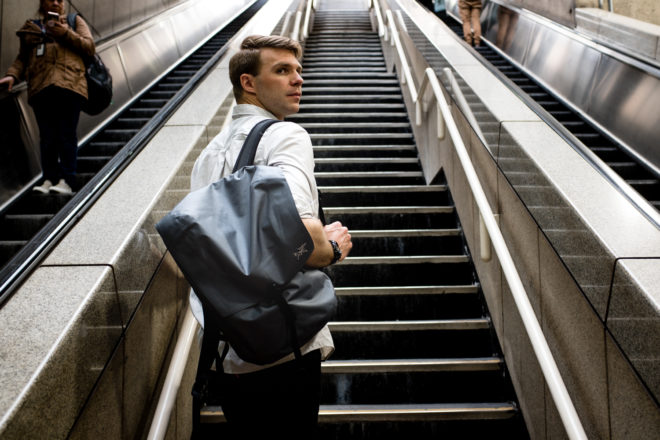
Personally I’m a big fan of building a zipper into the flap design of this bag as I’ve never fully trusted traditional messenger bags to prevent my gear from falling out. It’s a very sharp design, even incorporating a grab handle to help get into the bottom of the bag.
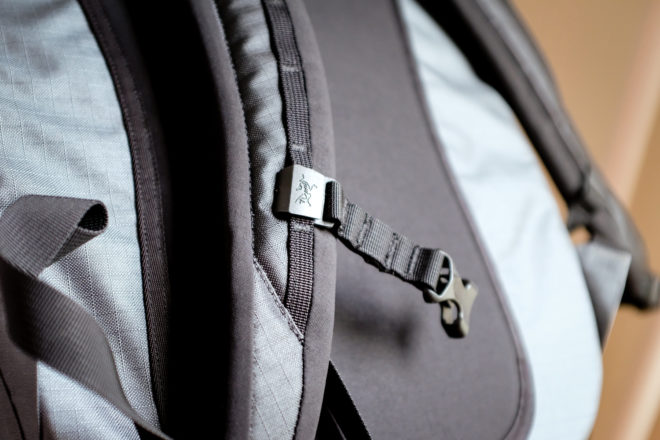
Inside the Granville 20, it feels like I’ve got a mobile office on my back. There’s a frame sheet in the back to help the bag carry and add support. On top of this there are two sleeves, one for a 15″ laptop, and a zippered pouch for cords. Due to some great design the laptop sleeve floats in the bag. It’s surprisingly protected despite the apparently minimal padding.
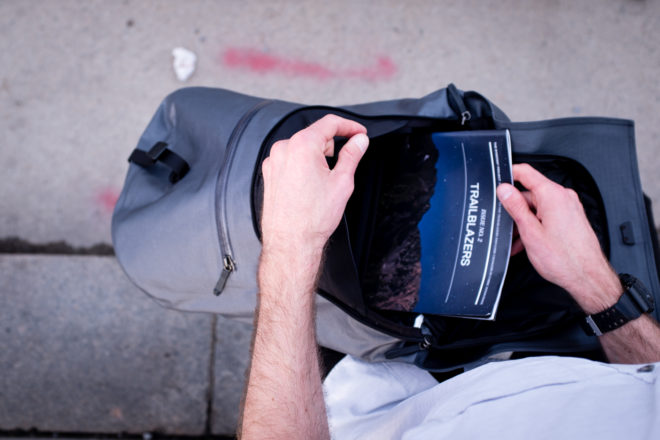
I enjoy how this bag carries, though it rides high on the back. For a day when I’ve got a computer, files, and lunch with me I’m reaching for the Granville 20 Backpack. Furthermore, if I had to choose just one bag from the Granville line to use on a daily basis, the Granville 20 Backpack would be it.
Granville 16 Zip Backpack
16L, 26 oz, $249
While owning an Arc’teryx Veilance Nomin 2.0 pack is a dream we all share, it’s going to remain a dream for most because of its $800 price tag. Enter the Granville 16 Zip Backpack, the next closest bag in the Arc’teryx lineup (appearance-wise) at a third of the price.
Side note, I asked Vincent about the similarities between the Nomin 2.0 and Granville 16. As he explained, while they both use the same AC² construction, the Granville 16 has a much more cushy suspension and totally different organization system.

That said, the Granville 16 Zip Backpack is a workhorse of a bag. I find it very easy to use in the sense that all of its pocketing fits my EDC without having a bunch of unused or pointless pockets. Likewise its access points are all extremely logically placed. The main pocket holds a pair of zippered pockets and sleeves. The forward pocket can also be accessed from a side zipper which I appreciate when biking with this bag, as I can easily sling it over one shoulder to get inside. Finally there’s a top zippered pocket to hold keys and a wallet.
At 16 liters I’m not exactly carrying heavy loads with the Granville 16 Zip Backpack, but whatever I am schlepping is carried very effectively thanks to the addition of a frame sheet. This frame sheet adds enough rigidity to the backpack so that biking in a hunched over position won’t put that force on my laptop.
The Granville 16 Zip Backpack is a workhorse of a bag.
For both the Granville 16 and Granville 20 backpacks, the frame sheet is sewn into the shoulder panels of the bags. While astute Carryologists will notice a zipper concealing the frame sheet, Vincent explains that this zipper is there only for the construction of the backpack, which is why it’s inside out.
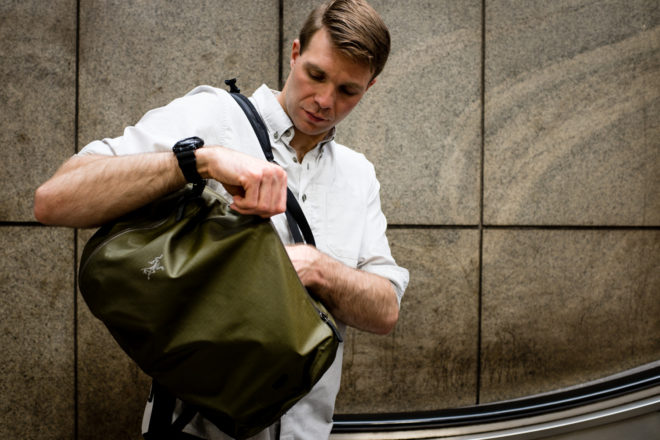
While for most bags a frame sheet is the literal backbone of the suspension system, Katie describes that with the Granville line the frame sheet is just one component of an effectively carrying bag. “To allow these bags to fit a wide range of bodies, a lot of form had to be built into the packs. In addition to a rigid frame sheet, this can be done thanks to the properties of the AC² construction.”
What this means when wearing the bags is that they fit better into the lumbar and wear closer across your back. What’s more, the entire Granville line has been designed to have a non-gendered fit. The bags will all fit comfortably whether you’re a 1.6-meter tall female or a 2-meter tall male. The suspension on these bags is really something special that has spoiled me during my few months of testing the Granville line.
Granville 16 Courier Bag
16L, 23 oz, $199
The messenger (courier) bag. For being such a ubiquitous piece of carry, so many messenger bags frankly just don’t carry all that well. While the Granville 16 Courier is a fairly simple bag as far as features go, there’s a lot that went into the patterning of this bag. The result is a bag that is absolutely dialed in with its fit and carry.
Starting with the back panel, there’s one piece of molded foam with a pair of creases on both sides. When I’m on my bike, instead of this bag wanting to rotate around my body, the Granville 16 Courier is naturally sitting in the contours of my back.
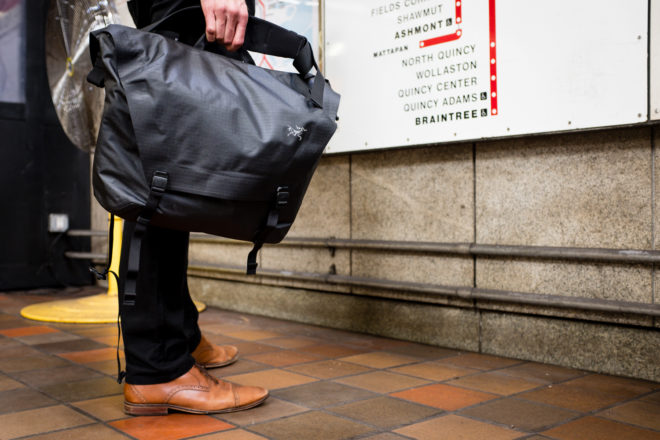
There’s then a reversible chest strap with a nice touch of metal hardware that further secures the bag where it’s needed. Katie points out that a big reason why this bag wraps so closely around the body is the way in which the panels of the bag have been shaped during the construction process.
While for most bags a frame sheet is the literal backbone of the suspension system, with the Granville line the frame sheet is just one component of an effectively carrying bag.
Flipping the bag over there’s a zippered flap that conceals the main compartment and a separate smaller exterior pocket. Spoiler alert, if you’ve read the section about the Granville 20 Backpack, the layout of the Granville 16 Courier is nearly identical. The only difference being the lack of a frame sheet and an array of pouches laid out slightly differently. Still, a 15″ laptop will fit comfortably inside along with a day’s worth of gear.
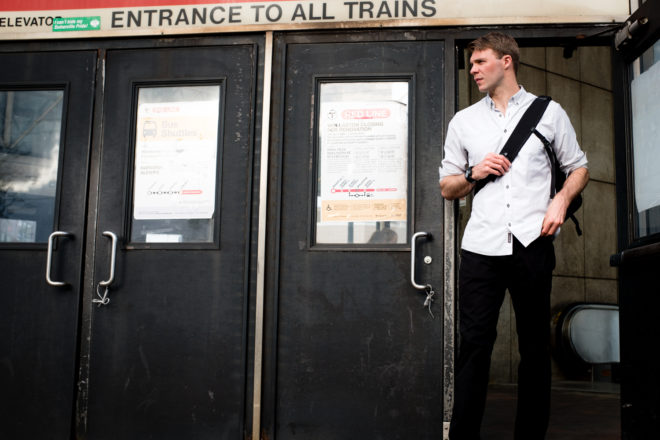
A common theme throughout the entire Granville line is the use of high-quality touch points. All the latches, zipper pulls, harnesses, etc. were designed in-house with an impressive amount of iterations, from designing out of clay to 3D printing. Arc’teryx gear heads will recognize the latches as similar to the belt latches found on Arc’teryx pants.
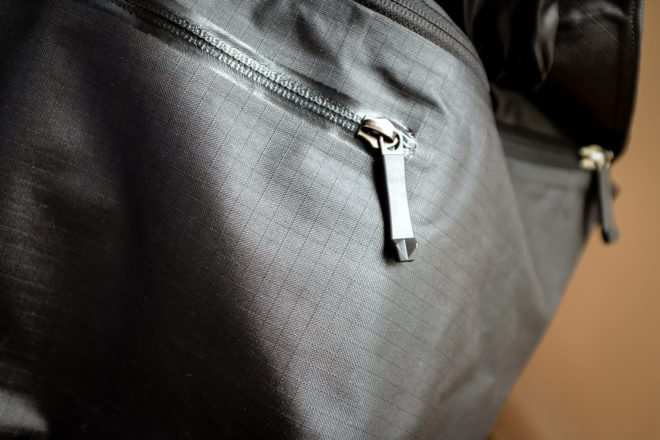
Of all the bags in the Granville line, I find the padding on this strap (and the Granville 10 Courier) to be the most comfortable. It’s much thinner and wider than the straps on the two backpacks and in turn it sits easier across my chest. If these bags weren’t so expensive and I actually knew how to sew, I would be tempted to Frankenstein these straps onto the backpacks. They’re that good.
Granville 10 Courier Bag
10L, 18 oz, $179
The Granville 10 Courier Bag can best be summed up as follows. Take the Granville 16 Courier Bag, shoot it with a shrink gun (with the volume dial set to 10 liters), and boom, you’ve got the Granville 10 Courier Bag.
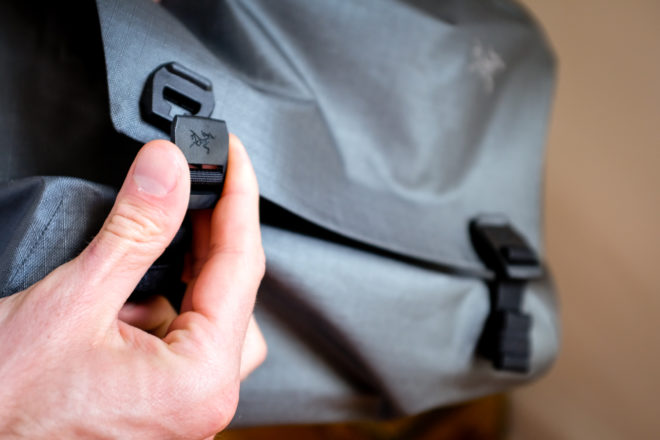
To be fair, the design process was a bit more nuanced than that. As Katie explains, “the Courier 10 Bag evolved directly from requests from APAC customers to meet the market desire for small sling bags.”

Yes, the two bags are identical save for an ever so slightly different interior pocketing layout. That and the space for a 15″ laptop is now designed for a 12″ laptop. I do appreciate Arc’teryx keeping dual buckles on this bag (as they did for the 16L version) as these are very pleasing to use and keep some perspective on the bag from looking too small.
Granville 18 Tote
18L, 12 oz, $119
In the world of carry, a tote is the equivalent of the egg test in a restaurant – can a chef prepare a simple egg to perfection? Totes are ubiquitous, simple and sold at Ikea for $1. So what does a $120 tote bring to the table?
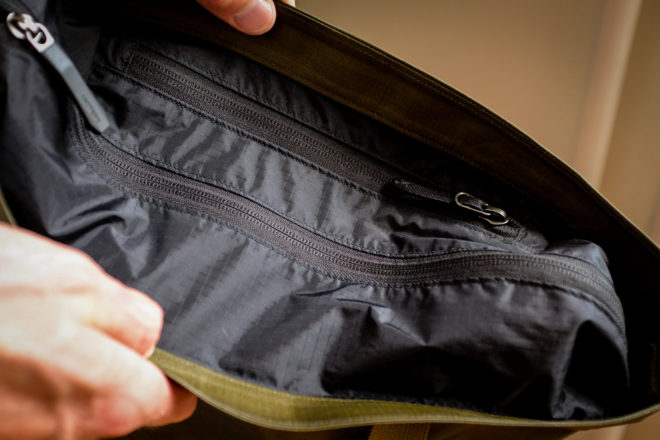
Simply put, the Granville 18 Tote is a splendid piece of carry. As all totes are, it’s straightforward. There’s two compartments, the main zippered body and a smaller pouch for a wallet and keys. On the exterior there’s a pair of grab handles and a detachable shoulder strap. That’s it.
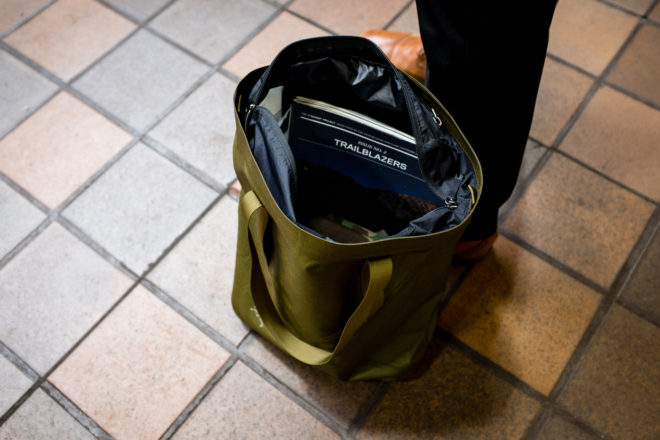
But let’s talk about how the Granville 18 Tote carries. Walking with the empty tote at my side it’s got this immaculate balance as it swings effortlessly in my hand. When loaded, the five panels of this bag give it both an eye-catching cross hatch pattern and the ability to carry surprisingly heavy loads. The Granville 18 Tote has become my go-to grocery getter and a perfectly sized carry-on when traveling.
Wrapping Up
After a few months using all five of these bags I’m genuinely impressed with the overall line. Not just based on how excellent they are to carry with, but how well they’ve stayed true to the six design points put out for the Granville line. Design points that aren’t just marketing jazz, but really built into the DNA of the bags.
Sure, on the surface they’re sharp-looking bags accented with some really good touch points. But as you get more familiar with the bags those design points really start to stand out.
With the new Granville line Arc’teryx has created an exceptional line of everyday bags. Yes, they’re expensive and the size is on the smaller side. That said, if you’ve got your carry dialed in and are looking for a bag that carries well, looks stunning and is built as good as they come, the Granville line is it.





 Carry Awards
Carry Awards Insights
Insights Liking
Liking Projects
Projects Interviews
Interviews
